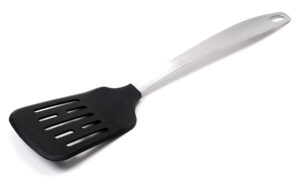
If you already suspected that we are surrounded by toxic chemicals in our homes - yes, your suspicions are true. A new study found that toxic flame retardants are in many household items that we use daily, specifically black plastic items (e.g., kitchen utensils, toys, takeout containers). That's because black plastic items tend to include recycled plastics.
In the study the researchers tested 230 store-bought items in the Seattle area for flame retardants, and found flame retardants in 85% of them. All the tested items were of black plastic or had black plastic somewhere in them (e.g., underside of toy cars). Showing that the flame retardants are pervasive, the 10 items with the highest levels of flame retardants were a sushi tray, toy car, peeler, travel checkers set, toy beads, and other kitchen utensils.
The problem with recycled plastics is that much of it comes from plastic that originally had flame retardants and other toxic chemicals added to it, for example electronics and electric products. When these recycled plastics are added to ordinary household items, the original toxic chemicals are in them, and now the consumer gets exposed to them. For example, in food utensils, toys, takeout containers, office supplies, and more. These items do NOT need flame retardants in them.
The study found that up to 2.3% of the weight of the household products were flame retardants. Some of the chemicals they found have been phased out, but are still winding up in recycled plastic. Studies show that flame retardants migrate from cooking utensils into food, and from toys into saliva. These chemicals are linked to cancers, endocrine and reproductive problems, and other health problems. Also, they tend to bioaccumulate in the environment and in people. Yikes!
Bottom line: At this point try to avoid black plastic items or items with some black plastic, especially in toys, food containers, and kitchen/household products. Right now view all "recycled plastic" items as problematic and to be avoided.
From Medical Xpress: From kitchenware to toys, household items linked to toxic flame retardants
From toys to kitchenware to food takeout trays, researchers have discovered a toxic chemical banned for its link to cancer in many common household items. Exposure to the flame retardant can come with serious health risks.
"We knew even before we started this study that there is no reason for our food-contact items, kitchen utensils, or toys to contain harmful flame retardants," lead study author Megan Liu explained in her report.
"While I'm doing what I can to switch my household items to safer alternatives, I hope that studies like this, along with the ever-growing body of research proving how dangerous plastics are, will help push our governments and retailers to act now and shift towards safer materials."
Published in the journal Chemosphere, Liu and her fellow researchers discovered nine toxic flame retardants in household items containing black plastic. Some of the items had high concentrations of the chemicals, up to 2.3% in weight.
In 70% of the samples tested, they found traces of deca-BDE, a retardant banned by the Environmental Protection Agency in 2021. But newer retardants were also found, including a hormone-disrupting chemical recently detected in human breast milk.
According to Liu—environmental advocacy group Toxic-Free Future's science and policy manager—the dangerous chemicals are likely making their way into household items through poor recycling practices.
"We know that some electronics companies put highly hazardous flame retardants in their products, and thought it was pretty likely that some of that flame-retarded plastic would be recycled and make its way into household items like toys and kitchen utensils," she said. "And that's what we found: flame retardants linked to cancer and hormone disruption are ending up in products we use for eating or preparing food, or that our kids play with."
The most common flame retardants, PBDEs, can disrupt brain development in children and have been linked to greater cancer risks. Bromophenols, PBDE alternatives, can affect fetal development and have been detected in both placenta and breast milk.
Liu offered some advice on how to avoid contamination: Avoid black plastics where food and children are involved.
"Since receiving the results for this study, I have replaced all my black plastic kitchen utensils with plastic-free wooden or stainless steel ones," she wrote. "And I opted for reusable glass containers instead of keeping and reusing my black plastic takeout containers."
